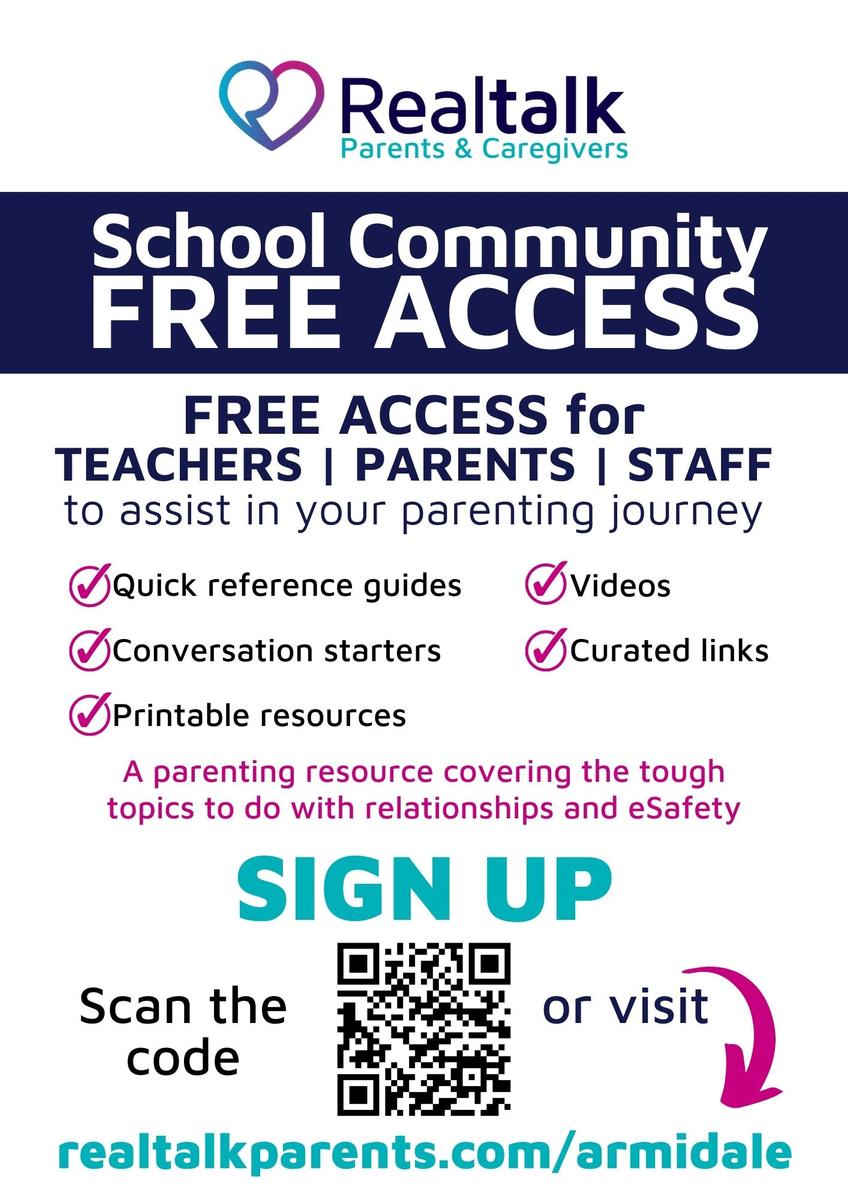Parent News

Council of Catholic Schools Parents - CCSP
Newsletter - 2024 Issue 3 OUT NOW!!!
Catholic Schools Parents Association
CSPA - family engagement resources
- Letter from Catholic Schools Parents Association
- FB posts
- Media Release
NCEC - National Catholic Education Commission
Family Relationship Centre
Please see below for upcoming courses
Zoom courses are here!
All welcome. It’s cold and nobody wants to come out, below are some courses you can take in the privacy of your own home while the kids are at school. And they are all FREE!
For more information please call Pedro on 6738 7200 or to register 1800 372 826
Please note: Courses will only go ahead if there are enough numbers, registration is essential.
Real Talk Parents Free Membership
The Armidale Catholic School Office has arranged for our entire school community (parents, teachers and staff) to have free premium level access to our Real Talk Parents membership site. Click on the link below to take advantage of this great resource.
Cancer Council Snippets
Good for Kids
Swap It
Anxious kids? Teach them to take off their anxiety goggles
by Dr Jodi Richardson
Do you find it hard to focus on the present?
There’s always so much to do and plan for as parents. It’s no wonder our minds wander so much. But to think that we spend nearly half of our lives thinking about things other than what we are doing means there’s an awful lot we’re missing out on.
When we’re fully engaged with what’s happening, there’s so much to experience. Bringing our thoughts back to the present moment can be like landing them on a calm, quiet, relaxed island in the midst of stormy seas.
When our minds wander to troubling thoughts, we end up experiencing pain and suffering at times when we’re often warm and dry, fed and watered, safe and secure. Like when we’re in bed. Snug and relaxed in our comfy beds, our doona keeping us warm (or a sheet to keep us cool), with a lovely soft place to lay our heads. Could we be more content in that moment? If only our minds would stay with us!
It’s the same with our kids. It’s often at the end of the day when they’re no longer engaged in activities that they begin to think and worry.
Their minds are far away from the reality of being safe in their rooms with loving family close by but they are sick with worry about future events.
Sometimes thoughts are so ‘sticky’ it’s hard to let go
It’s hard being a wandering minds back to the present when we’re so swept up in our worries. It takes practice to notice a wandering mind, gently ‘unhook’ from the thought and return our attention to the present moment. That’s the practice of mindfulness. Notice, unhook, return, repeat.
Put your head where your hands are
A lovely woman at one of my retreats told me her grandma’s favourite saying was “put your head where your hands are” meaning think about what it is you’re doing while you’re doing it. That’s smart!
Noticing our thoughts are wandering and bringing our attention back to what we’re actually doing is a skill, which gets easier with practice. It’s a powerful skill to teach kids as it to gives them perspective and importantly, the space they need for positive change.
Viewing the world through anxiety goggles
When our kids feel anxious they look at what’s happening around them through ‘anxiety goggles’. It’s like when you look through a pair of glasses with red lenses and everything looks red. Take them off and all is clear again. What if we could help our kids to take off their anxiety goggles and learn to look at their thoughts rather than from them? It would bring them such relief.
Creating a lovely space between our kids and what they’re thinking
We can help our kids do this by developing their metacognition (thought-noticing) skills. That way, when their minds wander to their worries and troubles they can notice they’re actually ‘lost in thought’ and not really experiencing the events they are thinking about. It would help them to ‘unhook’ from their daydreaming and importantly, bring their minds back to the present moment.
Thought-noticing
This is a wonderful skillset which helps our kids to manage their mental health. When kids tune into their thinking, they immediately distance themselves from it. Rather than being lost in the thoughts that are making them feel anxious, they can mentally step back and see the thought for what it is. Just another thought that comes and goes like all the ones before and all the ones to come.
Teaching thought-noticing to kids
There are many ways to teach thought noticing to kids. Look at these ideas like a ‘Choose your own adventure’. Start where you like and go in any direction that feels right for you and your family. If the idea you try isn’t quite the right fit, choose another!
Do you hear what I hear?
Lay down comfortably side by side and spend 2 minutes listening for any sounds you can hear, near or far. When you’re finished, compare what you heard and open a discussion about how our minds often wander away with our thoughts. Kids will know this as ‘daydreaming’. Share how your mind wandered and invite your child to do the same.
Tell me more
Day-to-day conversations are great for thought noticing. It’s about asking the right questions. Here are some examples to get the thought noticing conversation started: “Can you tell me more about why you think that? Why do you think you got so upset when we had to go straight home? Why do you think you’re putting off doing your homework? How will you know when your painting is complete?”
Name your mind
If we get our kids to give their minds a name, we open up opportunities to ask them different questions. For instance, if your child name’s his/her mind Sam. You can ask your child what Sam is thinking. This encourages your child to step back and take a helicopter view of him or herself.
Post-meltdown reflection
In the aftermath of a meltdown or outburst, when calm has returned and your child or teen has moved on, take some time to ask why he/she got so upset over what happened? Ask questions like “what did your mind say to make you feel upset?” for younger children or “can you tell me what you were thinking that made you feel so angry, frustrated, disappointed etc.?” for older kids.
Developing metacognition or ‘thinking about thinking’ skills fosters self-regulation among children. As contributing to children’s mental health and happiness, metacognition helps kids be more successful, more resilient and be able to problem-solve because they are less likely to get caught up in their worries.
And remember, your GP is a great place to start if you have any issues with your kids that you’d like reassurance or advice on. Make time for a chat.





